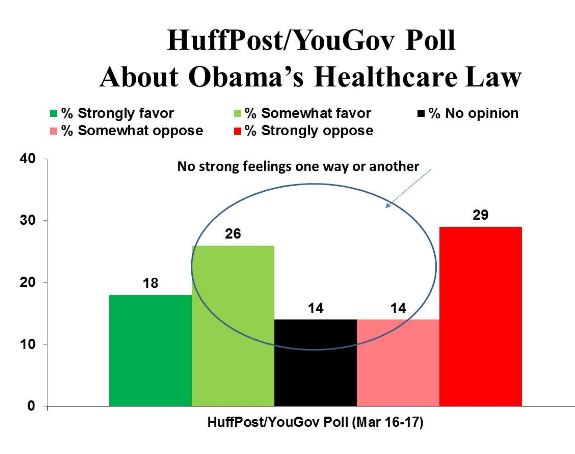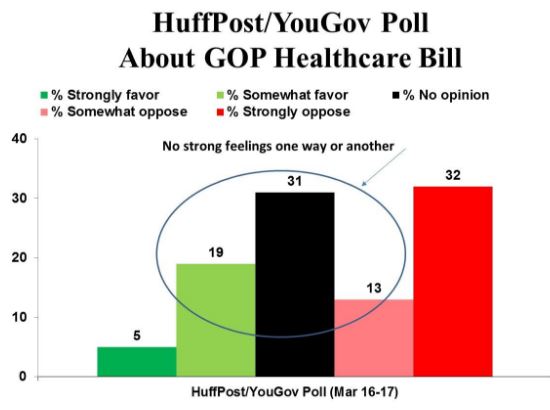
(Credit: PicServer.com)
While most polls suggest the American public is hanging on every news story about the upcoming vote on the Republicans’ Health Care legislation, a HuffPost poll provides a quite different perspective.
By giving respondents an explicit “unsure” option, and by measuring intensity of opinion, the HuffPost/YouGov poll reveals a more nuanced public than what most pollsters measure.
The poll shows that three in ten Americans have no opinion on the issue, and another three in ten don’t feel strongly one way or another.
Overall, 32% say they are strongly against the GOP legislation, with just 5% in favor. Thirty-one percent have no opinion, and another 32% either favor (19%) or oppose (13%) the legislation “somewhat.”
As shown previously on this site, when respondents say their opinion is “not strong” or they favor/oppose a policy “somewhat,” that typically means they don’t really care one way or the other. More than six in ten Americans, according to the HuffPost/YouGov poll, fall into that category.
The public is almost as apathetic about Obamacare itself. The same poll shows 18% who strongly favor Obama’s health care law, with 29% strongly opposed – and just over half unengaged. Fourteen percent have no opinion, while 40% either favor it (26%) or oppose it (14%) “somewhat.” (Percentages add up to 101% because of rounding.)

What are we to make of these results?
It’s important to keep in mind that the HuffPost/YouGov poll is of respondents who choose to be part of the polling enterprise. They “opt in” or volunteer to be part of a poll, which means that the respondents are almost surely much more engaged in policy matters than is the average American. If over half of the respondents are unengaged in the healthcare debate, the percentage of unengaged American adults nationwide is likely to be even greater.
Nevertheless, the results provide a better indication of how many people really care about the policy than most polls. It would appear that much of the public (more than half) is not fully engaged and thus presumably many people could be open to arguments in favor and opposed.
With respect to the GOP bill, the results also suggest that among people who really care about the issue, opinion is lopsided – with opposition much greater than support.
Still, no single question can provide much insight into the dynamics of public opinion. Additional questions that would explore various other aspects of the legislation – such as why people oppose the legislation – are also required. Do people oppose the GOP plan, for example, because it doesn’t go far enough in repealing Obamacare, or because it cuts benefits provided by Obamacare?
The HuffPost/YouGov poll did ask some additional questions, one which reaffirmed widespread public disengagement: More than half did not know that the Congressional Budget Office estimated the GOP bill would result in fewer people being insured.
Such a high level of disengagement of the public is, unfortunately, more the rule than the exception.







